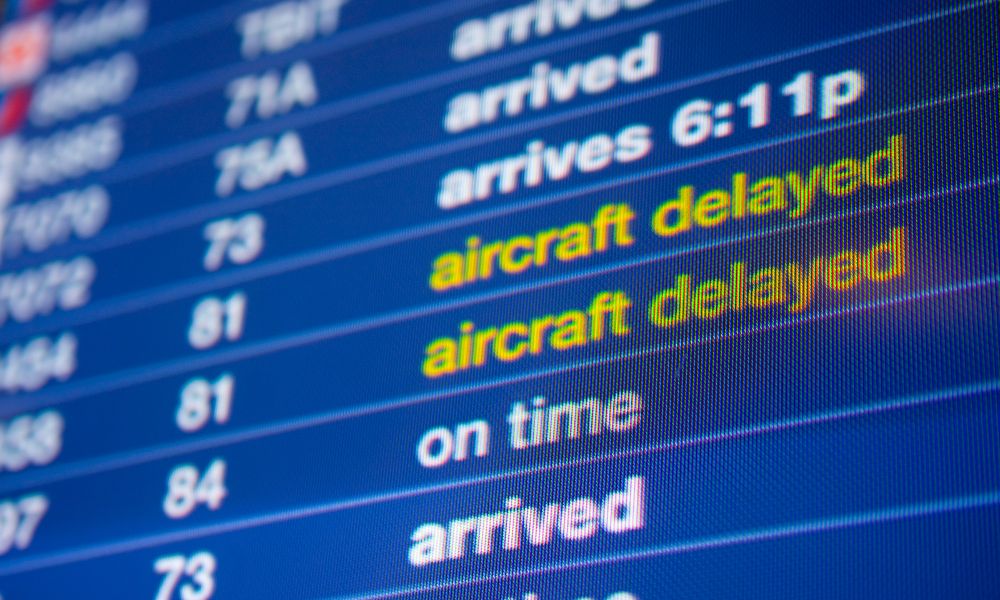Trip Delay Insurance: What you need to know
The best-laid travel plans don’t always come to pass, and that’s especially true when it comes to departing on a long-awaited trip. All kinds of things can cause a delay to your planned trip, and trip delay insurance covers you for brief and unexpected delays to the start of your trip.
It’s important to know what kinds of scenarios are covered by travel delay coverage, as well as how this type of coverage differs from other common elements of a good travel insurance policy. When you have a good understanding of what travel insurance covers, you’ll be best positioned to be eligible for benefits if your plans go awry.
What does trip delay mean?
Trip delay insurance generally reimburses you for expenses you incur if you’re delayed a defined period of time.
Keep in mind that the delay you’re making a claim for must meet the minimum duration as defined by your policy. For example, if being delayed for 12 hours or overnight means you missed your next flight, that may be covered by your policy. Whereas a short delay of just 45 minutes may not.
Trip delay insurance can also cover the costs of an unexpected hotel room, meals, or local transportation as a result of a delay.
Again, any delay would have to meet the exclusions and conditions of your policy and fall under a covered reason. In addition, any reimbursement would be subject to a maximum limit determined by the insurance company.
So be sure to keep your reasonable expenses within the policy’s agreed limit, and don’t rack up a huge bill on your credit cards as you wait out your delay. If you do, you may not be reimbursed for all of it.
Don’t forget that almost every travel insurance plan includes 24-hour assistance services, so if you’re delayed and you need help finding a hotel or making alternate travel arrangements, you can call for help.
The reason for the delay to your trip has to be one of the covered reasons as defined by your insurance plan. These may include situations like your flight being grounded due to a mechanical issue, a strike, natural disaster, civil unrest, your travel documents being lost or stolen, or inclement weather disrupting travel. Keep in mind that if, say, you missed your flight because you arrived late to the airport, this may not be covered by travel delay insurance as it was within your control.
Does travel insurance cover flight delays?
If your trip is delayed due to the fault of an airline — a staffing shortage, overbooking a flight, or something similar — you can’t always expect that the carrier will reimburse you for all related costs. What you’re entitled to claim from the airline will vary by carrier, circumstance, and whether or not you’re in the U.S. or somewhere else, so don’t rely on it as the ultimate failsafe.
If you’ve purchased trip delay coverage, it’s more likely that one way or another, you’ll be able to claim benefits for a delayed flight — be it from the airline or your insurance company. Since flight delays are very common, you don’t want to lose money on your extra expenses if the carrier decides you’re not entitled to reimbursement.

What is the difference between trip interruption and trip delay?
There are all kinds of ways your planned trip schedule can be disrupted — from delay to interruption to outright cancellation — and thus there are different kinds of insurance plans for each. Trip cancellation is for situations when your trip cannot go forward at all, and you file a claim to recoup as much as possible of your trip cost.
This is not to be confused with cancel for any reason coverage, which allows you to cancel your trip for any reason and recover a percentage of your non-refundable trip costs.
Trip interruption coverage comes into play when your trip is already underway, but you have to end your trip early due to illness, accident, or some other unforeseen event.
Understanding the difference between each of these scenarios — and ensuring you have coverage for each of them — will help ensure that no matter what happens to your trip you are not totally out of pocket for expenses. Once it comes time to time to fill out a claim form, you’ll hopefully benefit from all the protection of your policy and receive a reimbursement from your insurance company.
What Expenses Are Covered by Trip Delay Insurance?
While we’ve already discussed various costs that can accumulate during unexpected travel delays, it’s useful to have a summarized list for quick reference. Trip delay insurance typically covers expenses that are both necessary and reasonable, ensuring you’re not left financially burdened while waiting for your journey to resume. Here’s a breakdown of the types of expenses that are commonly covered:
Accommodation Costs: If your delay necessitates an overnight stay, trip delay insurance can cover the cost of a hotel room.
Meals: This includes food and beverages during the delay. Remember, the coverage is for reasonable expenses, so luxury dining may not be fully covered. Be aware, there may be a per-day limit for expenses.
Transportation: If you need to arrange for alternate transportation to and from the airport, hotel, or other necessary locations, these costs can be reimbursed.
How to File a Claim for Trip Delay Insurance
Understanding the correct procedure to file a claim for trip delay insurance can significantly ease the process and help ensure that you receive your benefits without unnecessary delays. Here’s a step-by-step guide on how to proceed:
- Documentation: Keep all receipts and detailed records of expenses you incur as a result of the delay. This is crucial as it serves as proof of the costs you faced due to the unforeseen delay.
- Proof of Delay: Obtain official documentation from the airline or transportation provider that details the cause and length of the delay. This documentation is essential as it supports the validity of your claim under the covered reasons stipulated in your policy.
- Contact Your Insurer: Inform your insurance company about the delay as soon as possible. Each insurer may have slightly different procedures for notification, so it’s important to follow their guidelines closely.
- Submit Your Claim: Fill out the necessary claim forms provided by your insurer. Attach all relevant documentation and receipts, and submit the complete package according to the insurer’s instructions. Prompt submission can expedite the review and reimbursement process.
Common Exclusions in Trip Delay Insurance
Understanding the common exclusions in trip delay insurance is important for travelers. , For example, if you arrive late to the airport and miss your flight, this type of delay, being under your control, will not be eligible for coverage.
Additionally, scenarios that involve personal negligence or events not specifically listed in your insurance policy, such as forgetting essential travel documents or errors in personal travel planning are also excluded from coverage. Being aware of these exclusions can help ensure that you are prepared and not caught off guard by uncovered expenses.

Tips for Choosing the Right Trip Delay Insurance Policy
Choosing the right trip delay insurance policy involves more than just selecting the first option you find. It is important to carefully read and understand the fine print of the policy to know exactly what is covered and what is excluded. Comparing different policies is also beneficial as it allows you to find the best coverage that suits your specific travel needs.
Additionally, checking the coverage limits is vital; ensure that the policy provides adequate coverage for expenses like meals, accommodation, and transportation, which can vary widely depending on your destination. Finally, consider any additional coverage options that might be beneficial for your circumstances, such as “cancel for any reason” add-ons, which provide further flexibility and peace of mind for your travel plans.
Real-Life Scenarios: How Trip Delay Insurance Saved the Day
Trip delay insurance can be a lifesaver during unexpected travel disruptions. Here are a few real-life scenarios that demonstrate its value:
Weather-Related Delays:
During a severe winter season, a family traveling to Colorado got stuck in a major airport hub due to a heavy snowstorm. The storm led to numerous flight cancellations, forcing the family to spend an extra night at a nearby hotel. Thanks to their trip delay insurance, all expenses for their unplanned hotel stay, and meals at the hotel restaurant were covered. This coverage allowed them to manage the inconvenience without worrying about the additional financial burden.
Mechanical Issues:
A business traveler was set to fly from New York to London for a critical series of meetings. However, just before boarding, it was announced that the flight would be delayed due to unexpected mechanical repairs on the aircraft. The delay extended overnight, requiring an additional stay and a rescheduled flight for the next day. The traveler’s trip delay insurance covered the cost of local transportation and the hotel room, along with meal reimbursements during the extended wait. The policy ensured that the traveler could focus on adjusting their meeting schedules instead of the disruption’s financial implications.
Lost Documents:
A solo traveler exploring Southeast Asia faced a significant hiccup when their backpack was stolen, containing their passport and several travel documents. This theft caused a delay in their travel plans, as they needed to wait for emergency travel documents from their embassy. During this stressful time, their trip delay insurance covered additional nights in their hotel, meals, and local transportation to the embassy and police station. The insurance provided a layer of security, significantly easing the logistical and financial stress associated with such an incident.
Frequently Asked Questions About Trip Delay Insurance
How long does a delay have to be to file a claim?
- Typically, the delay must be between 6 to 12 hours, depending on the specifics of your policy. It’s essential to review your insurance terms to understand the minimum required delay before you are eligible for reimbursement.
Can I claim for multiple delays during one trip?
- Yes, as long as each delay meets the criteria specified in your policy, such as the minimum duration and reasons for the delay, you can file claims for multiple incidents during the same trip, subject to the limit set for that benefit.
Is there a maximum amount I can claim?
- Yes, there is typically a maximum benefit amount set by your policy, which limits the total reimbursement you can receive for delays. This amount varies by insurer and plan, so checking your policy details is crucial.
Conclusion: Why Trip Delay Insurance is Essential for Travelers
Imagine setting off on your well-planned vacation or an important business trip, only to be halted by an unexpected delay. Whether it’s a sudden snowstorm, a mechanical issue with your plane, or any other unforeseen event, such disruptions can not only derail your plans but also lead to unforeseen expenses. This is where trip delay insurance becomes a game-changer. It acts as a financial safeguard, ensuring that you are not left out of pocket due to delays.
By thoroughly understanding your trip delay benefits, knowing how to file claims efficiently, and being aware of any exclusions, you can travel with a deep sense of security, knowing that you’re well-protected against the whims of travel unpredictabilities.
Battleface: Buy Your Trip Delay Insurance as A One Off Product
Planning your travels can be thrilling, but have you considered how to protect yourself against potential delays? Discover battleface, the only provider in the United States where you can purchase trip delay insurance as a standalone product. This unique offering is perfect for travelers who seek specific, straightforward coverage if you are not opting for add-ons.
With battleface, you gain not just coverage but also peace of mind, freeing you to enjoy the exciting parts of travel without sweating the small stuff. So why wait? Secure your trip with battleface today, and travel smarter and safer.